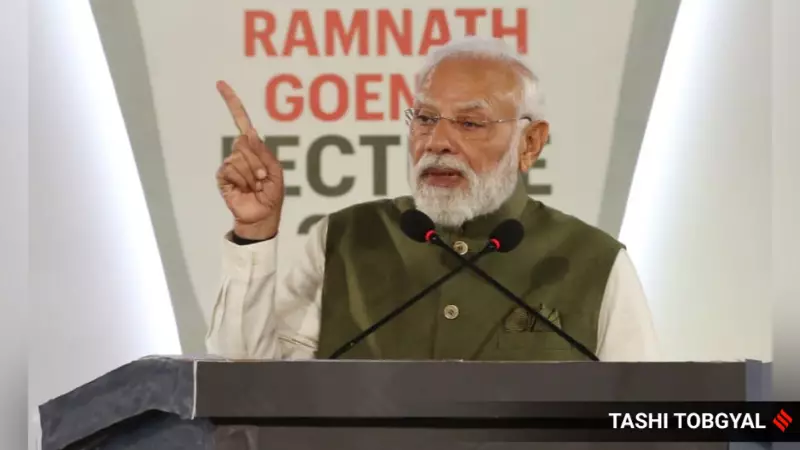
Prime Minister Narendra Modi has issued a powerful call to action, urging citizens to eliminate the enduring influence of Thomas Macaulay from Indian education and thinking within the next decade. This declaration came during his address at the Sixth Ramnath Goenka Lecture in Delhi on Monday, November 19, 2025.
The Colonial Legacy and Its Impact
During his significant speech, Prime Minister Modi emphasized that Macaulay's primary objective was to create Indians who "are Indians by appearance but British at heart." He stated that the nation had paid a heavy price for this colonial mindset, which established the deep-rooted belief that Western or foreign elements were inherently superior.
"The feeling of pride in what was ours gradually diminished," Modi observed. "We started looking toward foreign countries for innovation. This mentality led to a trend in society where imported ideas, imported goods, and imported services were considered superior."
RSS's Historical Concern with Macaulayism
The Prime Minister's statements reflect a core concern that the Sangh Parivar has consistently raised for decades. This position aligns perfectly with the RSS's long-standing advocacy for indigenizing education and decolonizing the Indian mind.
The roots of this concern trace back to the second RSS sarsanghchalak M S Golwalkar, who in his seminal work "Bunch of Thoughts" highlighted Macaulay's imperialist designs. Golwalkar quoted Macaulay's famous declaration: "We must at present do our best to form a class of interpreters between us and millions whom we govern — a class of persons Indian in blood and colour, but English in taste, in opinions, in morals and in intellect."
More recently, in October 2025, RSS sarsanghchalak Mohan Bhagwat reinforced this position during an address in Mumbai. "We were educated in the Macaulay knowledge system... We are Indians, but our minds and intellect became foreign. We must completely free ourselves from that foreign influence," Bhagwat asserted.
The Expansion to Marxist Influences
During the 1970s, the Sangh's concerns expanded beyond Macaulay's influence to include what they perceived as Marxist domination in academia, particularly within social science institutions. This development coincided with Aligarh historian Nurul Hasan becoming the Education Minister after Indira Gandhi allied with the CPI following the Congress split in 1969.
Marxist scholars often criticized what they termed "ancient myths" and advocated for a "scientific approach" to deconstruct them. Consequently, the Sangh Parivar began addressing both "Macaulayist distortions" and "Marxist distortions" as interconnected challenges, noting that both represented Western thought systems influencing Indian education.
Political Battles in Education Reform
The movement toward educational indigenization gained significant momentum when the Atal Bihari Vajpayee government assumed power in 1998. Murli Manohar Joshi, as Minister of Human Resource Development, initiated several controversial reforms.
Joshi commissioned new NCERT history textbooks and attempted to reform school curricula to "nationalise and spiritualise" education. His efforts included increasing the representation of Indian cultural essentials in curricula from 10% to 25%. His tenure witnessed substantial controversy surrounding the inclusion of "value education" and proposals to teach "Vedic astrology" in universities.
Opposition parties and academic critics labeled these initiatives as "saffronisation" of education. When the Congress-led UPA government came to power in 2004, they replaced Joshi's NCERT textbooks with new versions that remain functional today, though with multiple deletions during the Modi years.
Recent Developments and Textbook Changes
Significant changes began appearing in educational materials from 2018 onward. As reported by The Indian Express, textbooks for students of Classes 6 to 10 started incorporating new or expanded content on ancient Indian philosophy, ayurveda, yoga, teachings of the Upanishads and smritis, and scientific achievements in ancient India in areas such as astronomy and metallurgy.
More recent changes include the 2024 introduction of the Class 6 English language textbook titled "Poorvi," which featured revamped content emphasizing Indian culture, tradition, and ancient knowledge. This development aligned with the National Education Policy 2020's call for curricula "rooted in the Indian and local context and ethos."
However, these changes have sparked debates about what constitutes "Bharatiya" in India's diverse cultural landscape. Earlier this year, the NCERT faced criticism from Kerala Education Minister V Sivankutty regarding English textbooks featuring Hindi titles. The NCERT defended its position by explaining that the textbooks were named after musical instruments and classical ragas because these elements represent "India's rich musical heritage common across all linguistic and cultural traditions of the country."
The Deeper Challenge of Decolonization
According to academics close to the Sangh, the changes implemented thus far remain piecemeal. They argue that unless new NCERT textbooks are commissioned comprehensively, occasional deletions will serve limited ideological purpose.
The challenge extends far deeper than textbook revisions. At a superficial level, educational indigenization might involve literal interpretations of ancient literature as historical truth, but this approach is unlikely to gain global acceptance. At a more profound level, it requires establishing a new epistemological system based largely on Indian philosophical traditions to reinterpret the country's knowledge systems.
BJP leader and former MP Vinay Sahasrabuddhe acknowledged the magnitude of this challenge. "The challenge is huge, but we need first steps," he stated. "The biggest challenge is that what Macaulay did here many of his contemporaries did in Africa and other parts of the world, leading to the establishment of a Eurocentric system to make sense of the world."
Sahasrabuddhe also pointed to contemporary challenges, including what he described as an "obsession with political correctness" in academic circles and the global spread of "wokeism."
Former BJP MP Rakesh Sinha clarified that the Prime Minister's vision primarily concerns "the decolonisation of our imagination, in which we give too much of a centrality to the West." He emphasized that "Our education system should contextualise our knowledge systems; it is not as if we replace schools and colleges with Vedic vidyalayas. But our philosophy should get credit."
Academic Perspectives on the West vs Non-West Binary
Not all academics embrace the binary approach to decolonization. Projit Mukharji, who teaches history at Ashoka University, argues that the "West versus non-West" division is inherently simplistic.
"This West vs non-West divide itself is Orientalist in nature," Mukharji explained. "In the act of resisting the West, we end up reproducing it. The Europe of today owes a lot to non-European cultures, just as non-European cultures also owe a lot to Europe. What we have everywhere are entangled histories stretching back millennia."
As India embarks on this ambitious ten-year journey to decolonize education, the nation faces complex questions about preserving cultural identity while engaging with global knowledge systems. The success of this initiative will depend on developing an approach that honors indigenous traditions while acknowledging the interconnected nature of human knowledge across civilizations.





